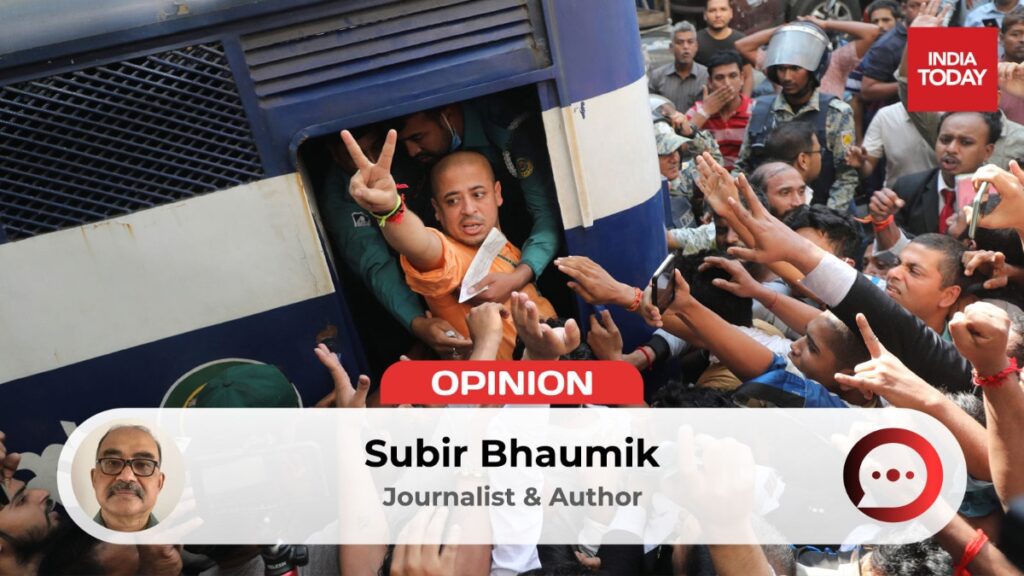Chinmoy Krishna Prabhu, a prominent monk leading protests against alleged atrocities on Hindus in Bangladesh, was arrested by Dhaka police on Monday, November 25. The same day, the Chinese Embassy in the Bangladeshi capital hosted a reception for leaders of Islamist political parties, including representatives from Bangladesh Jamaat-e-Islami, Hefazat-e-Islam Bangladesh, Khelafat Majlis, Bangladesh Khilafat Andolan, and Nizam-e-Islam Party. Jamaat-e-Islami chief Shafiqur Rahman was the event’s star attraction.
Chinese ambassador Yao Wen, described by many as Dhaka’s most active foreign diplomat, observed at the event: “Regardless of changes in domestic or regional circumstances, the China-Bangladesh relationship has remained steadfast, progressing steadily in the right direction.”
“This stable partnership has become a pillar of regional peace and prosperity,” Wen said. “China-Bangladesh friendship is deeply rooted in the community and benefits both nations.”
The upcoming visit of the delegation of Islamist political leaders comes less than a fortnight after a four-member delegation from the Bangladesh Nationalist Party, led by its vice-chairman Asaduzzaman Ripon, visited China. BNP joint secretary general Habibun-Nabi Khan Sohel, organising secretary Anindya Islam Amit, and media cell member and Jatiyatabadi Krishak Dal Joint Secretary Mahmuda Habiba were part of the delegation.
The BNP delegation attended the Political Party Plus cooperation event in Beijing, China, from November 7 to 16 which brought together representatives from political parties in Southeast and South Asian nations. The Chinese used to host the Awami League in such events earlier. But they discontinued overt contact with Bangladesh’s former ruling party after August 5.
China believes in engaging with those in power. They have no political favourites in Bangladesh or anywhere else, unlike India which has visibly enjoyed a special relationship with the Awami League and Sheikh Hasina for historical reasons and otherwise.
INDIAN CONTACT WITH NON-AWAMI PARTIES MINIMAL
The speed with which China is adapting to a rapidly evolving political situation in Bangladesh by maintaining lines of communication across the whole political spectrum stands in sharp contrast to India.
Indian outreach to the BNP and other Islamist parties, who have emerged as powerful players in the Bangladesh political scene after the ouster of the Awami League government headed by former Prime Minister Sheikh Hasina, has been minimal — at best, covert. Hasina has been sheltered in Delhi since August 5, the day she fled Bangladesh in the face of a mass upsurge growing out of a student movement. Scores of former Awami League leaders, including ministers, have taken refuge in India.
Hasina’s continued presence in Delhi has upset both the Interim government headed by Chief Adviser Mohammed Yunus and the Islamist parties. Yunus and his advisers have demanded Hasina’s extradition from India to stand trial for alleged involvement in the mass killings during the July-August agitations.
Chinese Ambassador Yao Wen has already said Beijing intends to use the 50th anniversary of diplomatic relations in 2025 as the “Year of People-to-People Exchange” to strengthen further bilateral cooperation in culture, education, healthcare, sports, and youth exchange. China, like the US, backed Pakistan during the 1971 Bangladesh Liberation War and established formal diplomatic relations with the newly created country only in 1975, after the ouster of the Awami League government and the assassination of Bangladeshi founding father Sheikh Mujibur Rahman in a bloody military coup. Since then, Beijing has engaged with whoever is in power in Dhaka.
The Chinese embassy hosted a gorgeous Cultural Nite on November 22, where Bangladesh’s foreign affairs adviser Touhid Hossain expressed “high appreciation for China’s longstanding support and contributions to Bangladesh’s development”. He praised China as a “trustworthy and sincere partner for Bangladesh”, emphasising that cultural exchange was a cornerstone and driving force of the China-Bangladesh relationship. He also called for deeper cooperation in all fields during “this critical period” of Bangladesh’s transformation.
Anticipating the emerging political landscape in post-Hasina Bangladesh, China quickly connected to the Islamist parties. Exactly a month after Hasina’s ouster, Yao Wen met Shafiqur Rahman at the party’s central office in Dhaka, becoming one of the first important foreign diplomats in 15 years to have visited the office of the Jamaat-e-Islami, which lost its political registration with the Election Commission during the Awami League rule. The Bangladeshi media reports quoted Yao Wen describing the Jamaat-e-Islami as a “well-organised” and “disciplined” party.
DELHI UPSET OVER HINDU ATROCITIES
India’s relations with Bangladesh’s interim government have only worsened — not only over Delhi sheltering Sheikh Hasina, but also over growing atrocities against Hindus and other minorities. India expressed deep concern over the arrest of Chinmoy Krishna Das.
The Ministry of External Affairs condemned the arrest and the denial of bail to the religious leader. The Indian government previously voiced alarm over the escalating violence against Hindus and other minorities in Bangladesh, including several documented incidents of arson, looting, and attacks on religious sites.
While the Yunus administration was quick to overrule Indian protests over minority atrocities as “exaggerated overreaction”, it was stumped when US president-elect Donald Trump and Republican Senator Tulsi Gabbard went public over atrocities on Hindus and other minorities in Bangladesh.
An all-party British parliamentary group for the Commonwealth recorded more than 2,000 atrocities since the fall of Hasina’s government and warned that the current regime may be weaponising the legal system to exact revenge. They have placed their report with British foreign secretary David Lammy, urging the necessary action.
(Subir Bhaumik is a former BBC correspondent and author. He has worked as a Senior Editor in Dhaka for bdnews24.com)
(Views expressed in this opinion piece are those of the author)
Tune In

